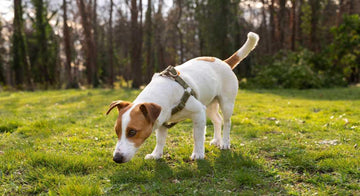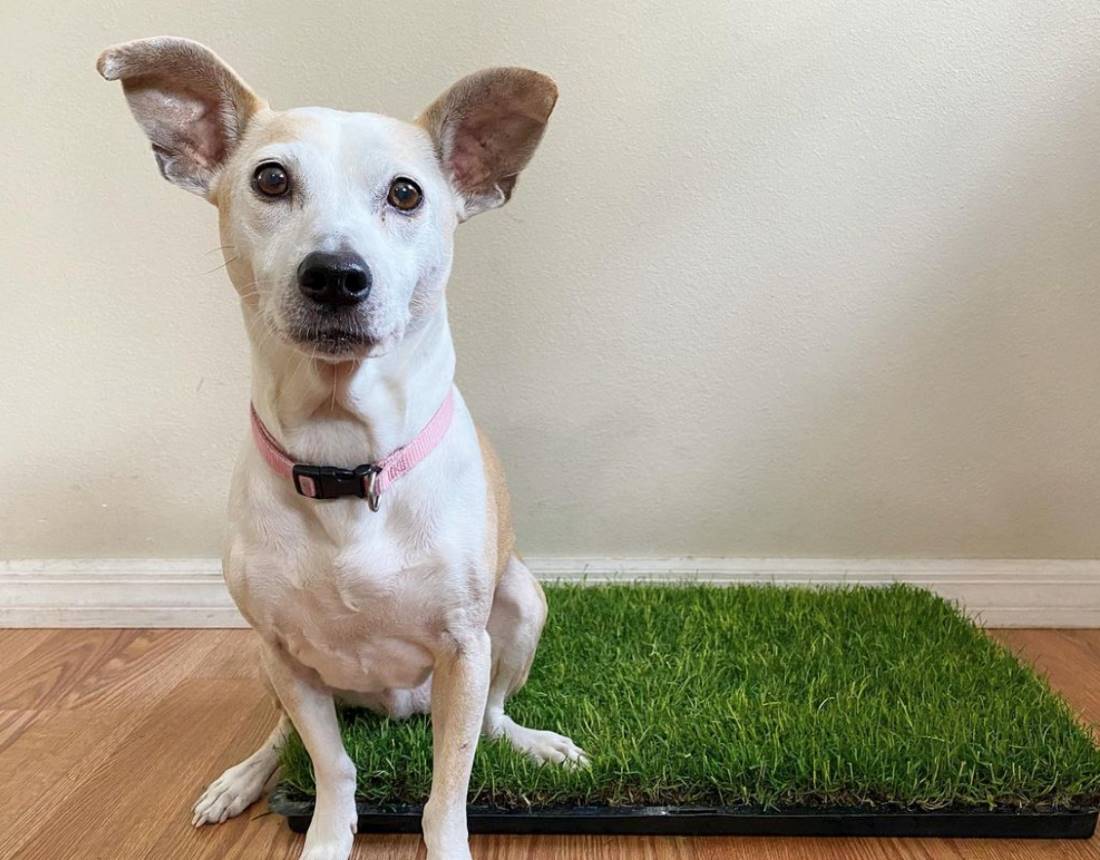
There's no way around it. Part of dog ownership is the less-than-pleasant task of regularly scooping their poop.
While this routine chore is never fun, it takes on a new importance when you realize that your dog's poop can provide valuable insights into their health. The color, size, and consistency of their poop can serve as indicators of their well-being, which may be key in preventing some health issues down the road.
So, what exactly should you be looking for in your dog's poop? As a provider of real grass potty pads for dogs, our dog poop guide aims to address all your questions and more.
Dog Poop Guide: What a Healthy Dog Poop Looks Like
Much like every dog is unique, their poop can vary too. The standard for normal, healthy dog poop may differ slightly among other dogs. In general, the stools of a healthy dog will be:
- log-shaped and segmented
- brown in color, ranging from light to dark shades
- firm but with pliable consistency of playdough
- moist and holds form when picked up
- the size of the poop should be roughly proportionate to how much the dog eats; and
- will have a mild odor but not too gross
Additionally, healthy dogs will not struggle to do their business and will comfortably pass waste that leaves little or no residue on the grass when you pick them up.

Below are some other considerations to analyze and check your dog's poop.
Dog Poop Color
A normal dog poop usually exhibits a deep, chocolate-brown color. However, a change in color may occur due to dietary changes or ingesting inappropriate substances. It may also signal potential digestion issues or problems with internal organs.
If the color change persists beyond a dietary shift, is observed in more than two stools, or with significant traces of blood, it is advisable to consult a vet for further evaluation.
Green: A green dog poop may indicate that your dog has been eating grass, probably to soothe an upset stomach. It may also point to a gallbladder issue.
Yellow: A slightly yellow dog poop may be normal, but yellowish-orange may suggest a liver issue or deeper indigestion.
Black: Black dog poop is worrisome and often indicates bleeding from the stomach or more serious diseases. Get your dog to the vet as soon as possible.
Red: Bright red streaks in your dog's poop, if not diet-related, are traces of fresh blood, which are a serious concern. It can be a sign of a slight tear around their bottom, intestinal issues, or bowel problems. It's crucial to consult your vet immediately.
White: A white dog poop can result from a problem with a dog's digestive system, liver, gallbladder, or pancreas. It is more common in dogs fed a raw diet with bones. Alternatively, your pup may have worms if you notice small white spots in their stool.

Dog Poop Consistency
Dog poop can vary in consistency, ranging from very runny to firm. Ideally, your dog's poop should be firm, cylindrical, and easy to scoop. Occasional looseness may not be alarming, but keep an eye for any persistent changes in consistency.
Loose: Loose stools are often a sign of diarrhea which dogs may get from eating something they shouldn't, like garbage or greasy table scraps. Stress, particularly after travel or changes in the environment, may also trigger acute diarrhea. In most cases, the issue should resolve on its own. However, if it persists, it could be a sign of a more serious problem such as a parasite, bacterial infection or inflamed colon.
Small and Hard Stools: Small, rock-hard stools in dogs are usual signs of constipation, which may result from excessive intake of insoluble fiber from vegetables, inadequate water consumption, or a diet of low-quality dog food. If your dog consistently experiences constipation, we advise adjusting your dog's diet and ensuring proper hydration.
Smell
We are all familiar with the less-than-pleasant smell of dog poop. However, a sudden, unusually foul smell may indicate underlying issues such as diarrhea, parasites, or other infections.
Content
From time to time, you may see some interesting foreign materials in your dog's poop—grass, rocks, and bits of plastic, to name a few—and that shouldn't be a cause for concern, but others are.
Worms: Puppies and young dogs are particularly at risk of worm infections, often acquired from their environment and which can be contagious. If you observe worms in your dog's poop, make sure to consult with your vet for an accurate diagnosis and the appropriate course of treatment.
Hair: A small amount of hair in your dog's poo can be normal, particularly for long-haired or double-coated dogs that groom themselves. However, too much hair may indicate excessive hair loss, which is a cause for concern.
Undigested Food: While occasional undigested bits of food in your dog's stool may not be unusual, consistent presence can point to a digestive issue or abnormality. If you observe this along with other symptoms such as weight loss or vomiting, it's advisable to consult with your vet for a thorough examination and proper diagnosis.
Mucus: Mucus in dog poop is normal, lubricating it as it passes along the digestive tract. However, a thick, slimy mucus coating, resembling sausage skin, can be a sign of colitis or inflammation of the colon caused by multiple underlying issues, such as parasites, dietary upset, and stress.
Grease: A stool with a greasy sheen can indicate excess fat in your dog's diet or a potential problem with fat digestion and absorption. It may also be a sign of underlying problems with the pancreas, gall bladder, or intestines.
READ: How to Maintain Kidney Health in Dogs

Takeaway
Scooping and inspecting your dog's poop may not be the most pleasant experience. But it's a crucial part of responsible pet ownership. Taking your dog for potty breaks offers a glimpse into your dog's health and provides valuable insights into their well-being.
While isolated cases of diarrhea or constipation may be managed at home, persistent symptoms warrant a vet consultation, particularly when accompanied by vomiting, weight loss, lethargy, or behavioral changes.
Submitting a stool sample to your vet can help identify any underlying issues, allowing for a comprehensive understanding of your dog's health and outlining the best course of action for effective treatment and care. Above all, a proper diet tailored to your dog's age and specific health conditions is fundamental for their overall well-being.
Visit our website for more dog-related resources and products like real grass pee pads.




